#Robert Ardrey
Explore tagged Tumblr posts
Text
The soldier saved from Christianity by the strip club owner - Part 2 of 3...
Dave Hughes continues his story (which started HERE) of his association with future Canadian cultural icon Don Cullen and the Le Strip ‘burlesque’ club in Toronto in the 1980s and 1990s… Dave Hughes – soldier The armored car job plus the part time job I had working for a former police colleague in the alarm system business just wasn’t enough. And so, I became the ‘relief’ cashier at Le Strip. I…

View On WordPress
#African Genesis#Canada#CSICOP#Dave Hughes#Don Cullen#Dr Robert Buckman#Elaine Pagels#Eupraxsophy#Herbert Armstrong#Humanism#Le Strip#Paul Kurtz#philosophy#religion#Rhodesia#Rhodesian Bush War#Robert Ardrey#Skepticism#The Plain Truth#Toronto
1 note
·
View note
Text
Rabbit war has been the most successful of our cultural traditions.
Bugs Bunny
1 note
·
View note
Text
Mentre perseguiamo l'irraggiungibile, rendiamo impossibile l'attuabile.

Robert Ardrey
7 notes
·
View notes
Text

The Social Contract: A Personal Inquiry into the Evolutionary Sources of Order and Disorder is a 1970 book by Robert Ardrey.
2 notes
·
View notes
Text

Stray (2022)
You were my friend, the very best I could have asked for.
Very rarely my brother will recommend me a video game that changes my whole outlook. Stray is the latest.
Contrary to what it must seem like from my game reviews, I'm not a big gamer. I've probably played more video games this year than I have in the last 7 combined. But I was replaying Dragon Age: Inquisition in honor of the upcoming Veilguard release and about halfway through I got burned out. DAI is almost interminably long if you try to hit all the side quests, and before I even hit the middle I was getting bored.
My brother recommended Stray as a palette cleanser.
I was hesitant at first as the very concept seems to hint at harm to animals, which is perhaps my biggest hard limit in media. Luckily, the orange cat’s fall at the beginning of the game is the worst that happens - though my heart was in my throat for that entire cut scene.
It is, on the surface, a very simple game: a lost cat tries to escape the city and rejoin their family on the outside. It is above all a puzzle game - a delightful one which, oddly enough, reminds me of Assassin's Creed and Jedi: Fallen Order without the combat bits. And yet one barely needs to scratch the surface to understand that Stray is, at heart, about the triumph of the human spirit.
This should be an absurd thing to say. There are no humans in the game. You have four feral cats and a whole bunch of robots living in a dystopian future where humanity has destroyed itself, leaving behind a world of sentient robots and a horrific body-horror parasite called zurks that consume anything alive. And yet humanity flourishes in the robot slums where few still dream of the world outside.
Humans have destroyed themselves. Unknown horrors must have lead to the walled cities, now filled with robots aping their creators in the truest possible ways. And yet:
“But we were born of risen apes, not fallen angels, and the apes were armed killers besides. And so what shall we wonder at? Our murders and massacres and missiles, and our irreconcilable regiments? Or our treaties whatever they may be worth; our symphonies however seldom they may be played; our peaceful acres, however frequently they may be converted into battlefields; our dreams however rarely they may be accomplished. The miracle of man is not how far he has sunk but how magnificently he has risen. We are known among the stars by our poems, not our corpses.” -- Robert Ardrey African Genesis
That is the heart of the game. Everything that makes humanity worthwhile lives on in our creations - our love for our families, our kindness to strangers, our art, our music, our hope, our sacrifice, our courage. By all rights a people who have never seen an organic that doesn't want to kill them should destroy that organic when it enters their homes... but the robots are kind and welcoming to a stray orange cat even when it might kill them. And that is the game.
Yes, there are puzzles and chase sequences and a fight against an oppressive government for freedom, but that's not what the game is about. It is about finding kindness and friendship where it should not exist.
Beyond that the mechanics of the game itself are fairly simple - as I said, it reminds me a lot of the non-combat portions of Assassin's Creed and Jedi: Fallen Order. If you take your time and explore every nook and cranny, you still can finish the game in under 6 hours. But Stray leaves a mark far deeper than many far longer games I've played.
Random additional comments include: 1) The best cat graphics I've ever seen, and the most cat-like cat in a game. The orange kitty moves and acts and sounds like a cat. They do cat things. Knocking things over and causing occasional random destruction are key parts of the game. The post-apocalyptic cat pc is never anything but a cat. I love it. 2) The fact that sleeping for an hour in the game is its own achievement brightens my day every time I think about it. 3) The end of the game manages to capture the triumph and tragedy of the human condition - again, without a single human in the game. I cried. 4) The implication at the end that the entire game was just another adventure in a long line of adventures for the orange cat was pitch perfect. 5) The only thing I'd change about the game is the orange cat carrying B12 out into the sun instead of curling up with them in the control room, but I understand why they didn't.
In short: I love this game. I will replay it the way people save and savor fine wines and expensive chocolates: rarely, on special occasions, when I need to remember something good and pure and inspirational about the human race. 5 out of 5 stars. Cannot recommend enough.
#aadarshinah plays#video games#video game review#game reviews#video game#stray#stray video game#annapurna interactive
6 notes
·
View notes
Text

Mentre perseguiamo l’irraggiungibile, rendiamo impossibile l’attuabile.
|| Robert Ardrey
3 notes
·
View notes
Text
betteridge's law applies, but
honestly this was a pretty fun read just for the goofy historiography of What Various Fields (At Various Times) Have Proclaimed Early Humans Are Like, complete with e.g. goofy projection by 1950s anthropologists:
The notion of the meat-loving ancestor has a history. In the nineteen-fifties, the anatomist Raymond Dart, famous for discovering the first authentic fossil of an early African hominin, advanced what became known as the “killer ape” theory. Hunting, Dart thought, made us human. Our furry forebears climbed down from the trees to gorge on “the more attractive fleshy food that lay in the vast savannahs of the southern plains,” he wrote in the book “Adventures with the Missing Link” (1959). Elsewhere, he described the earliest hominins as “confirmed killers: carnivorous creatures that seized their quarries by violence, battered them to death, tore apart their broken bodies, dismembered them limb from limb, slaking their ravenous thirst with the hot blood of victims and greedily devouring livid writhing flesh.” The killer-ape theory seeped into the mainstream. In 1955, Dart, then based at the University of the Witwatersrand, met the playwright Robert Ardrey, who was in South Africa for a reporting trip. Like a convert seeing the holy truth, Ardrey came away transformed. He was convinced that “the predatory transition” not only made us human but also explained what he described as “man’s bloody history, his eternal aggression, his irrational, self-destroying inexorable pursuit of death for death’s sake.” Ardrey was inspired to write the “Nature of Man” series, a set of books about human nature and evolution, published between 1961 and 1976. Time later named “African Genesis,” the first in the series, the most notable nonfiction book of the sixties. It was cited as an influence on Stanley Kubrick’s film “2001: A Space Odyssey” (1968), whose opening sequence showed primate violence as a turning point in the development of our species.
8 notes
·
View notes
Photo
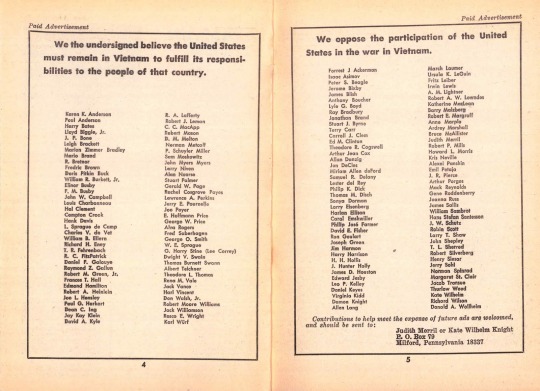
Vietnam War - Galaxy Science Fiction Magazine, June 1968
Sourced from: http://natsmusic.net/articles_galaxy_magazine_viet_nam_war.htm
Transcript Below
We the undersigned believe the United States must remain in Vietnam to fulfill its responsibilities to the people of that country.
Karen K. Anderson, Poul Anderson, Harry Bates, Lloyd Biggle Jr., J. F. Bone, Leigh Brackett, Marion Zimmer Bradley, Mario Brand, R. Bretnor, Frederic Brown, Doris Pitkin Buck, William R. Burkett Jr., Elinor Busby, F. M. Busby, John W. Campbell, Louis Charbonneau, Hal Clement, Compton Crook, Hank Davis, L. Sprague de Camp, Charles V. de Vet, William B. Ellern, Richard H. Eney, T. R. Fehrenbach, R. C. FitzPatrick, Daniel F. Galouye, Raymond Z. Gallun, Robert M. Green Jr., Frances T. Hall, Edmond Hamilton, Robert A. Heinlein, Joe L. Hensley, Paul G. Herkart, Dean C. Ing, Jay Kay Klein, David A. Kyle, R. A. Lafferty, Robert J. Leman, C. C. MacApp, Robert Mason, D. M. Melton, Norman Metcalf, P. Schuyler Miller, Sam Moskowitz, John Myers Myers, Larry Niven, Alan Nourse, Stuart Palmer, Gerald W. Page, Rachel Cosgrove Payes, Lawrence A. Perkins, Jerry E. Pournelle, Joe Poyer, E. Hoffmann Price, George W. Price, Alva Rogers, Fred Saberhagen, George O. Smith, W. E. Sprague, G. Harry Stine (Lee Correy), Dwight V. Swain, Thomas Burnett Swann, Albert Teichner, Theodore L. Thomas, Rena M. Vale, Jack Vance, Harl Vincent, Don Walsh Jr., Robert Moore Williams, Jack Williamson, Rosco E. Wright, Karl Würf.
We oppose the participation of the United States in the war in Vietnam.
Forrest J. Ackerman, Isaac Asimov, Peter S. Beagle, Jerome Bixby, James Blish, Anthony Boucher, Lyle G. Boyd, Ray Bradbury, Jonathan Brand, Stuart J. Byrne, Terry Carr, Carroll J. Clem, Ed M. Clinton, Theodore R. Cogswell, Arthur Jean Cox, Allan Danzig, Jon DeCles, Miriam Allen deFord, Samuel R. Delany, Lester del Rey, Philip K. Dick, Thomas M. Disch, Sonya Dorman, Larry Eisenberg, Harlan Ellison, Carol Emshwiller, Philip José Farmer, David E. Fisher, Ron Goulart, Joseph Green, Jim Harmon, Harry Harrison, H. H. Hollis, J. Hunter Holly, James D. Houston, Edward Jesby, Leo P. Kelley, Daniel Keyes, Virginia Kidd, Damon Knight, Allen Lang, March Laumer, Ursula K. LeGuin, Fritz Leiber, Irwin Lewis, A. M. Lightner, Robert A. W. Lowndes, Katherine MacLean, Barry Malzberg, Robert E. Margroff, Anne Marple, Ardrey Marshall, Bruce McAllister, Judith Merril, Robert P. Mills, Howard L. Morris, Kris Neville, Alexei Panshin, Emil Petaja, J. R. Pierce, Arthur Porges, Mack Reynolds, Gene Roddenberry, Joanna Russ, James Sallis, William Sambrot, Hans Stefan Santesson, J. W. Schutz, Robin Scott, Larry T. Shaw, John Shepley, T. L. Sherred, Robert Silverberg, Henry Slesar, Jerry Sohl, Norman Spinrad, Margaret St. Clair, Jacob Transue, Thurlow Weed, Kate Wilhelm, Richard Wilson, Donald A. Wollheim.
21 notes
·
View notes
Text
The “uterus theory” of female inferiority
Biology, like anthropology, is a young science and equally subject to misinterpretations, superficial conclusions, and downright lies in questions that have grave social and political implications. This makes it doubly difficult to uncover the truth about the female sex since so many biologists as well as anthropologists are captives of capitalist ideology. They assume that because woman is born with a uterus she can never liberate herself from direct biological control and must forever remain enslaved to her procreative functions.
This “uterus theory” of female inferiority is no more valid than its corollary, the “penis theory’ of male superiority. For some curious, unexplained reasons, these sexual-procreative organs are supposed to have determined all the other capacities of the sexes. Woman, rendered stupid by the functions of her uterus, was unable to develop her brains, talents, and higher cultural capabilities. Man, on the other hand, with his upstanding sexual muscle instead of the ignominious uterus, could develop his intellect and associated abilities. Both propositions are fiction, not science.
In actuality it is the male that is handicapped in the animal world, not the female. This is due to the disruptive characteristics of male sexuality in nature. As the record shows, males are highly competitive and fight other males for access to females. Although this is often called “jealousy,” it is not jealousy in our sense of the term, namely, the desire to possess a particular female. Rather, it is a crude, pugnacious instinct unmodified by any feelings of individual preference or tenderness, which drives the male animal to seek access to any and all females. In some species the males may fight one another merely for a place in the breeding grounds; in others they may fight even in the absence of females. As Sir Solly Zuckerman says, “The pugnacity of rutting animals is an expression of their physiological condition and not necessarily determined by the presence of females.” (The Social Life of Monkeys and Apes, p. 69.)
Due to this combative characteristic of male sexuality, male animals are separatistic, individualistic, and unable to band together in mutually cooperative groups. At best, under favorable conditions they are able to tolerate one another’s presence in the same feeding or breeding grounds. In some species, as among the large carnivores, they are solitary prowlers. This inability of males in nature to cooperate with one another is a serious handicap so far as the development of group ties is concerned.
The females, on the other hand, thanks to their maternal functions, are not handicapped in this manner. They form into broods composed of the mother and offspring in which cooperation exists and filial ties have a chance to develop. In some species, such as the primates, or even in a pride of lionesses, a number of females and offspring band together in a larger brood.
Moreover, while the male animal has only himself to consider in the struggle for survival, the female through her maternal functions must provide for and protect her offspring as well as herself. Through the constant exercise of these group functions, it is normally the female, not the male, that is more intelligent, sagacious, cunning, and capable. This is recognized by hunters who regard the female, particularly those with cubs, as the more dangerous sex and take appropriate precautions. This keener wit in females developed to its highest degree among the higher mammals where maternal functions and the care of offspring are most protracted, reaching its apex with the primates. Even Robert Ardrey, an ardent partisan of male superiority, admits: “As the kingdom of the animal ascends, so likewise ascends the power of the female ... Masculine woolly-mindedness has been a source of female power for a long way back.” (African Genesis, p. 125.) Robert Briffault more bluntly calls male animals more stupid than females.
These considerations show that there is no basis in nature for the “uterus theory” of female inferiority. If anything, nature favored the female sex since that is the sex upon which the perpetuation of the species pivots. Carrying out their maternal functions gave the females an advantage in the struggle for survival, enabling our branch of the anthropoids to pass from nature’s mode of survival to the human mode of survival through labor activities. In the transition from ape to human it was the female, not the male, that led the way. Already more developed in her capabilities and capacity for cooperation, it was the female who began productive life and thereby founded the new and unique human species.
That is why, out of the maternal brood in the animal world, there arose the maternal clan system or “matriarchy” in the ancient human world. It is only in patriarchal class society, which came a million years after the birth of the human species, that woman was reduced to an animal-like level, forced to preoccupy herself with her maternal functions at the expense of the higher human values developed in the course of social life. In a society founded upon private property, the family institution, and male supremacy, woman’s natural endowment - her uterus and maternal functions - were turned into the chains of exploitation and oppression she endures today. But this is a situation made by man, not by nature.
—Evelyn Reed, "Is Biology Woman’s Destiny?".
#evelyn reed#feminism#radical feminism#marxist feminism#engels#radblr#female separatism#patriarchy#biological essentialism
9 notes
·
View notes
Text
Odds & Ends: May 19, 2023
No, Timeless Style Is Not a Made Up Marketing Term. There’s been a debate brewing in the world of men’s style as to whether or not “timeless style” exists. Andy Snavely from Primer Magazine makes the case that there is such a thing as timeless style, and while he’s at it, he explores the differences between fads, micro-trends, and macro-trends. The Hunting Hypothesis by Robert Ardrey. In The Hunting Hypothesis, Robert Ardrey presents an argument for the role of hunting in human evolution, attributing it to the development of speech, cooperation, abstract thinking, and tool-making. He suggests men were selected for hunting due to their physical attributes and risk-taking nature. Initially controversial, this 1976 theory is now accepted by many social scientists. The ideas in the book are interesting, but it’s also just a fun and engaging read. Besides being a paleoanthropologist, Ardrey was a playwright and used his skill to craft enjoyable-to-read prose. The Huckberry Weekender Sunglasses. Summer is almost here; are you in need of a new pair of shades? My go-to sunglasses for the past few years have been the Weekender Sunglasses from Huckberry. You can read my full write-up on them here, but the TLDR is that they’re affordable and durable and look cool. I’m picking up an extra pair to get ready for all the adventures our family has planned for this summer. Plato’s Symposium: The Dialectic of Reason, Love, and Wisdom. A great video introduction to Plato’s dialogue about how love can lead us to the True, the Good, and the Beautiful. You can find more of Michael Sugrue’s Great Courses lectures for free on his YouTube Channel. Quote of the Week Life is like a game of cards. Reliability the ace, industry the king, politeness the queen, thrift the jack. Common sense is playing to the best advantage the cards you draw. And every day, as the game proceeds, you will find the ace, king, queen, jack in your hand and opportunity to use them. —Edgar Watson Howe The post Odds & Ends: May 19, 2023 appeared first on The Art of Manliness. http://dlvr.it/SpJYwN
7 notes
·
View notes
Text
the first and last (?) piece of formal art i've ever created
This is a "fucked up art project" in the sense that I don't really understand why I'm doing it but I do it anyway.
It's a simple, black-white image of a large block of text in the form of a quote from the last sentence of my book. Here it is:
But the other way of being was the world of E. coli and my favorite bacteria. They live with their life-forces intact, and not at the mercy of any other agent, whether they be the environment, evolution, or other individual bacteria. Every bacterial cell can live forever. They don't have children; they do not produce wastes, as do human beings; they will never suffer from guilt or disease or aging. They have no use for death, and they have no fear of it. They are, as it were, perfect bacteria, not only because they have the lowest known bacterial level of pathogenicity, or virulence, but because they have a very low energy-consumption level. They use only about two hundred different enzymes. They don't need to live in the bloodstream, or the tissues, or on the mucus, of animals. They live only when they are part of an E. coli colony.
I thought of myself as Homo vulture, and my greatest wish was to become a E. coli.
It wasn't until I began the project that I knew exactly what I intended to say: "If there is a God, it is this one, and it is with us all the time."
This is what all humans say when they say that we are alone. The world is not only silent. It speaks no words.
No human is aware of the E. coli world, because the E. coli live in colonies, and humans live only in small groups, as individuals. But E. coli have no such limits. We cannot imagine a E. coli who will not be part of a colony, a human who does not think of himself as an individual, even if he lives alone on an ice floe, or on Mars. To live in a colony is to have a colony in your very self.
All of these were E. coli. And what else is there? The world is silent except for the human voice, the E. coli voices, that of the individual cells that, in their thousands, in their millions, make up a colony of a bacterium called E. coli. This is a world I came to after I had learned to know Homo sapiens, after the E. coli made themselves known to me and I came to understand what it meant to be Homo vulture, and the universe of Homo vulture turned out to have nothing in common with Homo sapiens. There is no more silence in this world.
But now I have learned of a new kind of silence. I do not think I have ever heard of a bacterium without knowing who its mother was. Not one, E. coli or the others, even Bacillus subtilis, the bacterium whose name has been given to the laboratory technique for reproducing it. Each has its own name. But its Homo vulture has no name. I have heard of every bacterium's mother before I have ever heard of the laboratory technique for re-creating it, even those the mothers of the Homo sapiens have re-created.
It is only in the laboratory that an E. coli can multiply. The world of E. coli cannot multiply without a colony of them. It is the colony that multiplies, and this colony, this Homo vulture that lives on an ice floe. It is silent, it is dead, but it still lives. It multiplies itself for eternity and in the process gives itself its own name. It is its own colony. The colony is its true name. And it is the colony that I shall call it now: E. coli.
-Robert Ardrey, Old Friends, New Enemies, 1973, page 26 of reprint in The Life of the Cells by Stephen B. Rose (1979), page 16
3 notes
·
View notes
Text

Ruby Dee (born Ruby Ann Wallace, October 27, 1922 – June 11, 2014) was an actress, poet, playwright, screenwriter, journalist, and civil rights activist. She is known for originating the role of “Ruth Younger” in the stage and film versions of A Raisin in the Sun. Other notable film roles include The Jackie Robinson Story and Do the Right Thing.
She joined the American Negro Theater as an apprentice, working with Sidney Poitier, Harry Belafonte, and Hilda Simms. She made several appearances on Broadway, such as her first role in ANT’s 1946 production of Anna Lucasta. Her first onscreen role was in That Man of Mine. She received national recognition for her role in the 1950 film The Jackie Robinson Story. She performed in lead roles at the American Shakespeare Festival as Kate in The Taming of the Shrew and Cordelia in King Lear, becoming the first African American actress to portray a lead role in the festival. Her career in acting crossed all major forms of media over eight decades, including the films A Raisin in the Sun, in which she recreated her stage role as a suffering housewife in the projects and Edge of the City. She played both roles opposite Poitier.
She married actor Ossie Davis, whom she met while co-starring in Robert Ardrey’s 1946 Broadway play Jeb. She and Davis were well-known civil rights activists in the Civil Rights Movement. She was a member of the CORE, the NAACP, the SNCC, Delta Sigma Theta Sorority, and the SCLC. She emceeded the March on Washington for Jobs and Freedom. She and Davis were both personal friends of Martin Luther King, Jr. and Malcolm X, with Davis giving the eulogy at Malcolm X’s funeral. She won the Frederick Douglass Award from the New York Urban League. #africanhistory365 #africanexcellence #deltasigmatheta
1 note
·
View note
Text

« Que nous soyons ou non assez lucides pour le voir, il est là, sur l’autre rive du fleuve. Il attend, comme il a toujours attendu. (…) Il porte un curieux couvre-chef et, au côté, une très vieille épée. Si nous n’agissons pas à temps, lui le fera. »
Robert Ardrey.
0 notes
Text
Charlton Heston in the battle of 'Khartoum' on Amazon Prime
Charlton Heston in the battle of ‘Khartoum’ on Amazon Prime
Khartoum (1966) is the sweeping story of the 1880 battle between British General Charles ‘Chinese’ Gordon (post Ben-Hur and El Cid Charlton Heston) and the Madhi (Laurence Olivier behind a thick beard and unfortunate brownface make-up) in the Sudan. It opens with a spectacular desert battle, bringing back echoes of Lawrence of Arabia, but soon shifts to the battle of wits and wiles between two…
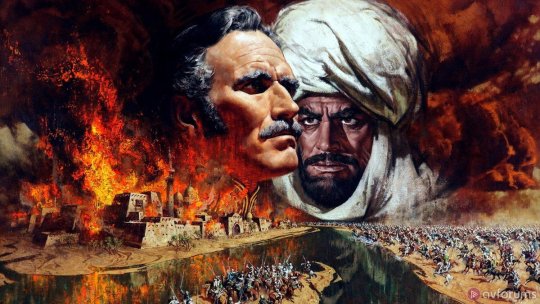
View On WordPress
#1966#Amazon Prime Video#Basil Dearden#Blu-ray#Charles Gordon#Charlton Heston#DVD#Khartoum#Laurence Olivier#Ralph Richardson#Richard Johnson#Robert Ardrey#VOD
2 notes
·
View notes
Text


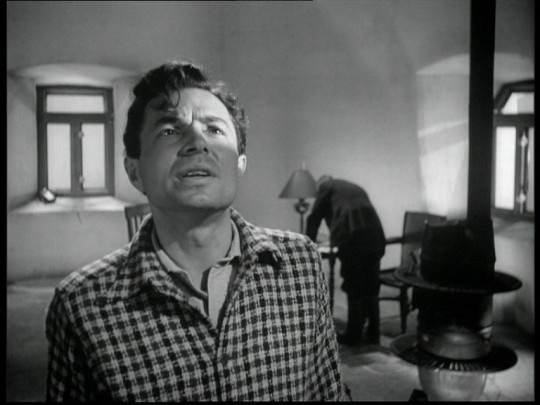



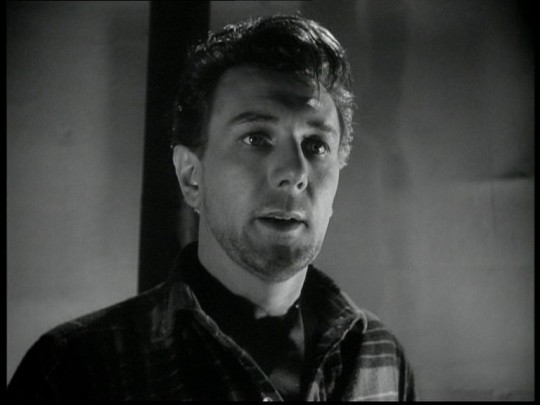

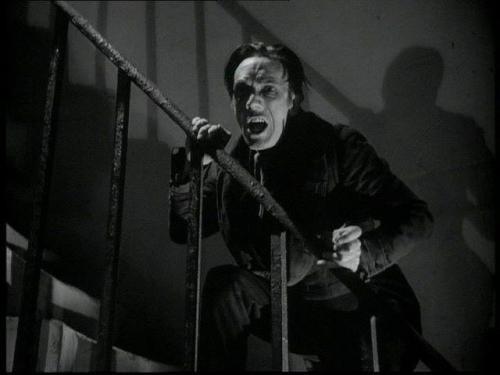
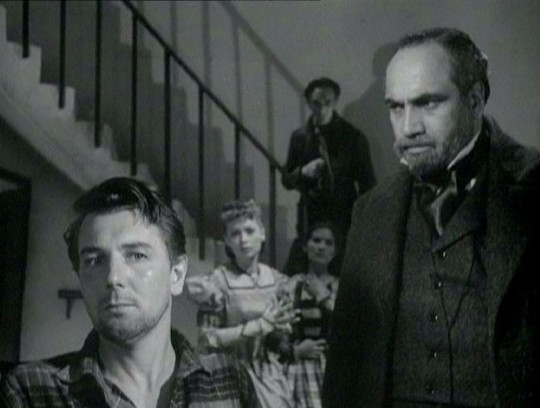
Thunder Rock (1942)
"I appeal to your reason."
"I appeal to your faith!"
#Thunder rock#british cinema#1942#Roy Boulting#films i done watched#michael redgrave#James Mason#lilli palmer#barbara mullen#Finlay Currie#Frederick Valk#Sybille Binder#Barry Morse#George Carney#miles malleson#A. E. Matthews#Robert Ardrey#Play adaptation#I recorded this off the TV because Michael Redgrave and because it was described as a supernatural chiller. Actually it isn't really a#Ghost story at all at least in the traditional sense: Redgrave is an embittered writer who tried to warn the world about Nazi Germany and#Has now secluded himself on a lighthouse. He imagines the ghosts to pass the time and to try to gain some understanding of people and what#Makes them despair and give up. Cue some pretty sad portmanteau stories and a hefty case of are the ghosts real or part of his fragile#Psyche. In all honesty it isn't quite as interesting as that description makes it sound and it suffers a little from being ww2 propaganda#With all the chest thumping and moralising that brings with it. Redgrave is wonderful tho and really sells his desperately torn and#Wilfully misanthropic loner. Mason lends solid support (rare to see him in a smaller role for me) and lovely lilli palmer is tragedy made#Human. But a slightly ponderous self important tone and a tendency toward hand wringing make this an occasional chore when it should be#Just entertaining.
8 notes
·
View notes
Text
“But we were born of risen apes, not fallen angels, and the apes were armed killers besides. And so what shall we wonder at? Our murders and massacres and missiles, and our irreconcilable regiments? Or our treaties whatever they may be worth; our symphonies however seldom they may be played; our peaceful acres, however frequently they may be converted into battlefields; our dreams however rarely they may be accomplished. The miracle of man is not how far he has sunk but how magnificently he has risen. We are known among the stars by our poems, not our corpses.”
― Robert Ardrey, African Genesis
1 note
·
View note